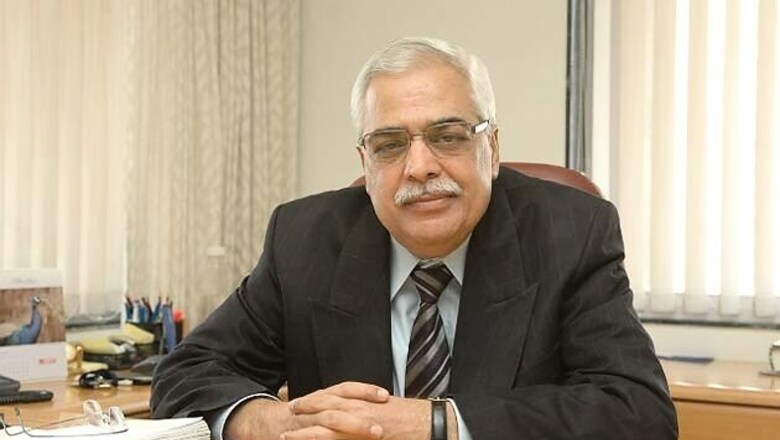
views
Arun Thukral, Managing Director, CIBIL tells us why India's first credit information company is a friend of the consumer and not an enemy.
PART II:
6) Who are CIBIL's competitors in India? Where does the company stand vis-a-vis competitors?
Arun Thukral: Along with CIBIL, the first credit bureau in the Indian market (Launched in 2004); there are three more bureaus present in India:
- Experian
- Equifax
- High Mark
It is a healthy development for India's credit information industry to see other players begin their operations in India. We welcome competition as it would eventually boost credit penetration in the country and bring financial discipline among individuals. Being the pioneer in the industry, we have a responsibility towards our members and consumers to continuously improve our products and services to provide quality and timely data with the help of the best technology.
7) How big a risk do banks and credit card companies run by lending to customers without verifying their credit histories?
Arun Thukral: Today almost no credit institution lends without consulting the applicants credit report and credit score. Access to credit information has made credit lending objective, information oriented and certainly more qualitative. With availability of credit information and analytical solutions for decision making banks and credit institutions can improvise their lending strategies, grow their portfolios while maintaining their asset quality and help drive sustainable credit penetration by creating increased credit opportunities for deserving consumers
8) What is your advice for consumers in terms of how they should manage their borrowing and maintain a clean record?
Arun Thukral: In order to ensure a good credit score, it is important to re-pay your loans on time. Financial discipline coupled with prudent credit management and a good payment history will ensure that you enjoy all the benefits associated with having a good credit record. Here are some ways for maintaining a good credit history and score:
Avoid late payments or defaults as far as possible: Your payment history has a significant impact on your Score. Late payments are viewed negatively by lenders because this indicates that you are having trouble servicing your existing obligations
Reduce your utilization of credit card limits: While increased spending on your credit cards may not necessarily affect your Score negatively, an increase in the current balance on the card over time is an indication of an increased repayment burden and may negatively impact your Score. Its always prudent to not use too much credit.
Maintain a healthy mix of credit: A higher concentration of home loans or auto loans (commonly known as Secured Loans) is likely to be more favourable for your credit score than a large number of unsecured loans. Although unsecured loans offer easy access to finance, its also by far the most expensive form of credit. More the number of unsecured loans with high utilization, larger are the payments resulting from its high rate of interest
Avoid behaving Credit Hungry: If you have made many applications for loans, or have recently been sanctioned new credit facilities, a lender is likely to view your application with caution. This Credit Hungry behaviour indicates your debt burden is likely to, or has increased and hence may be less able to service additional debt obligations
- Monitor your co-signed, joint accounts monthly.
- Monitor the loan accounts for which you have stood as a guarantor
- Review your credit score and history frequently
9) How far are we from customised pricing for customers now that credit bureaus are in place?
Arun Thukral: Consumers with a good credit history can certainly negotiate for better credit terms and conditions. Many banks and credit institutions offer added benefits like waiver in processing fee and speedier access to credit for consumers with a good credit history and a high credit score.
Customized pricing based on the consumers credit history is definitely the next evolution in the credit sector in India. We may soon experience this evolution across the credit market in India. Also with consumers becoming savvier on the benefits associated with good credit history and score, they will catalyze this change.
In what other sectors is credit information report being used and how?
The CIBIL Credit Report and Score is gaining increasing relevance in the lives of consumers, not only for availing credit, but also in other sectors like Investment & Securities, Telecom, Retail financing, Insurance, Stock Broking etc.
Investments and Securities: SEBI (Securities and Exchange Board of India) recently announced that Investment advisers will need to have a good CIBIL credit report and satisfactory research capacity to get permission to provide advise to investors in stocks and other capital market.
SEBI board feels that regulations need to be robust enough to safeguard the interest of investors in the capital markets and including the requirement of a credit report or score from CIBIL would ensure further strengthening of these regulations.
Retail financing: Now finance companies and banks also check creditworthiness of consumers, who are seeking to buy televisions, computers and other electronic products on EMIs to provide them instant financing at the store itself. With the help of DecisionCentreSM - an automated decision-making platform offered by CIBIL & TransUnion, finance companies and banks can check a consumers credit score instantly and offer them easy EMIs for purchase of the product on credit. They use this instant decisioning solution to check whether the consumer who desires to avail this credit facility would turn out to be a good re-payer or is he likely to default. This helps them make faster decisions at the front end counter making it a prudent and rewarding choice. Credit score checks can be beneficial for both consumers and financers. It enables financers to take instant decisions on whether to finance a product on credit or not, which in turn benefits consumers too.
Telecom: Telecom service providers are using the CIBIL TransUnion Score for making instant decisions on post paid mobile phone limits. When a consumer applies for a post paid telephone facility, the service provider will pull her/his credit score and credit history basis the information provided in the application. This information in the credit report and the score will enable the service provider to assess the consumers financial standing and assign an appropriate credit limit on the post paid connection basis their policies.
Insurance: Insurance companies are using CIBIL Credit Reports and a solution called CIBIL Locate Plus which provides them with updated contact information on their consumers. This information helps them to contact and follow up with their customers and enhance outreach.
Stock Broking: Stock Broking firms use CIBIL credit reports to increase their customer contactability. They are also using a credit information solution called CIBIL Bureau Credit Characteristics which provides them with data on the credit exposure on their clients. This information enables them to gauge the extent of net worth of their client.
Asset Reconstruction Companies (ARCs): ARCs use the credit information reports and solutions like CIBIL Portfolio Review and CIBIL Bureau Credit Characteristics to enhance the efficiency of their collections processes. This information gives them insights into the consumers overall credit profile and exposure and formulate their strategies accordingly.
In more developed economies, an individuals credit information report and credit score is critical reputational collateral and is being used for multiple purposes by various institutions. Employers review it before recruiting a new employee; landlords require it before renting out an accommodation and of course telecom providers check an applicants credit history for assigning limits. We may see similar evolution in India when a person's credit report and credit score will be imperative for a lot many things in addition to availing institutionalized credit facilities. Therefore it is very critical to maintain a good credit history and pay back the loan dues on time.
Part 1 of the interview




















Comments
0 comment